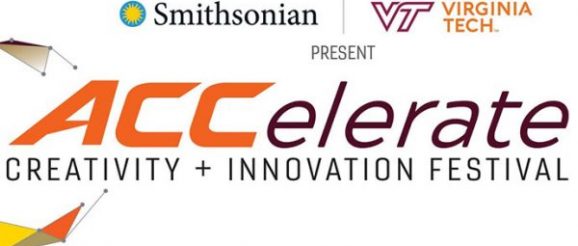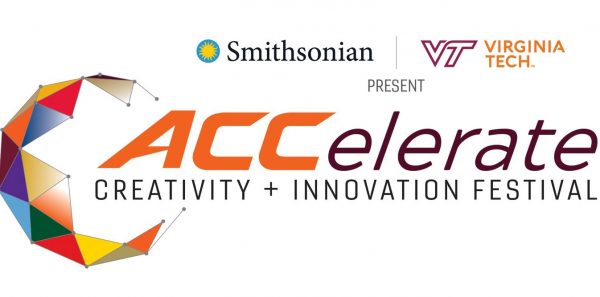ACCelerate Creativity and Innovation Festival Gives Experiential Learning a Boost

Three teams from Syracuse University will travel to Washington, D.C. in April to participate in one of the Atlantic Coast Conference’s premier events. But the venue is not what you might expect. Instead of joining other ACC teams on the playing field, the University will be represented among its peers at the Smithsonian’s National Museum of American History for the ACCelerate Festival—a celebration of creative exploration and innovative research happening at the intersection of science, engineering, arts and design from across the ACC and the Smithsonian. Visitors will view 25 interactive installations created by students and faculty, interspersed with ongoing museum exhibits.
 One of those interactive installations is Kairos: The Artifact. Led by Heath Hanlin, associate professor of film and media arts in the College of Visual and Performing Arts, Kairos translates enormous amounts of scientific data to present global warming hotspots to audiences in a multisensory virtual reality (VR) environment. “I have been working on this for three years, with the idea that this project would engage with science museums,” says Hanlin. “The logistics of presenting VR in a museum are kind of daunting.”
One of those interactive installations is Kairos: The Artifact. Led by Heath Hanlin, associate professor of film and media arts in the College of Visual and Performing Arts, Kairos translates enormous amounts of scientific data to present global warming hotspots to audiences in a multisensory virtual reality (VR) environment. “I have been working on this for three years, with the idea that this project would engage with science museums,” says Hanlin. “The logistics of presenting VR in a museum are kind of daunting.”
Hanlin reached out to Emily Stokes-Rees, associate professor of museum studies and director of the School of Design. “The initial conversation was about how to make a VR experience visitor friendly, including elements of interpretation for people who aren’t actively using the VR. We talked about the user experience, crowd control, the way it flows through and timing of how people view the exhibit,” says Stokes-Rees.
With a team of students, Hanlin and Stokes-Rees will be collecting data about how the experience works in the context of an interactive exhibit. Their goal is to understand how the VR environment and experience can be structured and integrated the mission of science museums. “The Museum of Science and Technology in Syracuse has been a great partner and has helped us learn from their experience with technology, but it’s been limited due to the pandemic,” says Stokes-Rees. “I can’t imagine a better way to work the bugs out of the system than the ACCelerate festival,” adds Hanlin. “The students immediately grasped the opportunity here and started asking the right questions. ACCelerate will give us real-world data that we can apply to iterate on how we present this powerful experience focused on climate change, with the ultimate goal of educating people and inspiring them to take action.”
Bruce Kingma, professor of entrepreneurship in the School of Information Studies and Whitman School of Management, is taking his Innovation, Design and Startups program students to lead an interactive invention experience designed to spark creativity in festival-goers. “I teach the creativity course and the first assignments that students encounter is to create a new toy that meets the needs of a demographic similar to that of a favorite toy they had in their childhood,” Kingma says. “The students come up with just amazing things and we have video clips of these presentations from the last few semesters.”
Inspired by these ideas, kids who visit the ACCelerate festival will be able to fill out an idea sheet with a new toy idea. “We’ll pick three of the best ideas and the winners will receive some Syracuse University swag,” says Kingma. He sees the ACCelerate experience as a great way to think about creativity, “The whole goal of the IDS program is to create new ideas, encourage innovation, and help students start new ventures. We want to enable students to make their ideas real,” he adds.
The University’s third team isn’t an exhibitor. Seth Gitner, associate professor of magazine, news and digital journalism and visual communications in the Newhouse School, will mentor a team of visual communications students who will be creating journalistic coverage of the festival. “It replicates the experience of being parachuted into an event, which is always an interesting endeavor because you don’t know what they’re going to get, says Gitner.” Gitner is deliberately leaving the desired outcome vague. Students might choose to do a photo documentary or a video, but he sees it as their choice. “As a journalist you have to talk to people, get the story, figure out your angle, connect with your characters. I will be in an executive producer role, there for support and advice. But this is really the students running their own show and figure out how they are going to convey what it’s like to be at this event and what stories come out of it.”
“We’re excited to support five faculty and 20 Syracuse University students—through competitive grants provided by the Office of Research and the SOURCE—to enable their participation in the ACCelerate Festival,” says said Ramesh Raina, interim vice president for Research. “The Office of Research is proud that we can give students a mechanism to partner with faculty in new ways to experience hands-on learning themselves, and to create ways for the public to learn in turn. It’s a wonderful opportunity to gain exposure to new research and creative ideas from other ACC schools, as well as to show off some of the incredibly innovative work that Syracuse is known for.”
The post ACCelerate Creativity and Innovation Festival Gives Experiential Learning a Boost first appeared on Syracuse University News.
